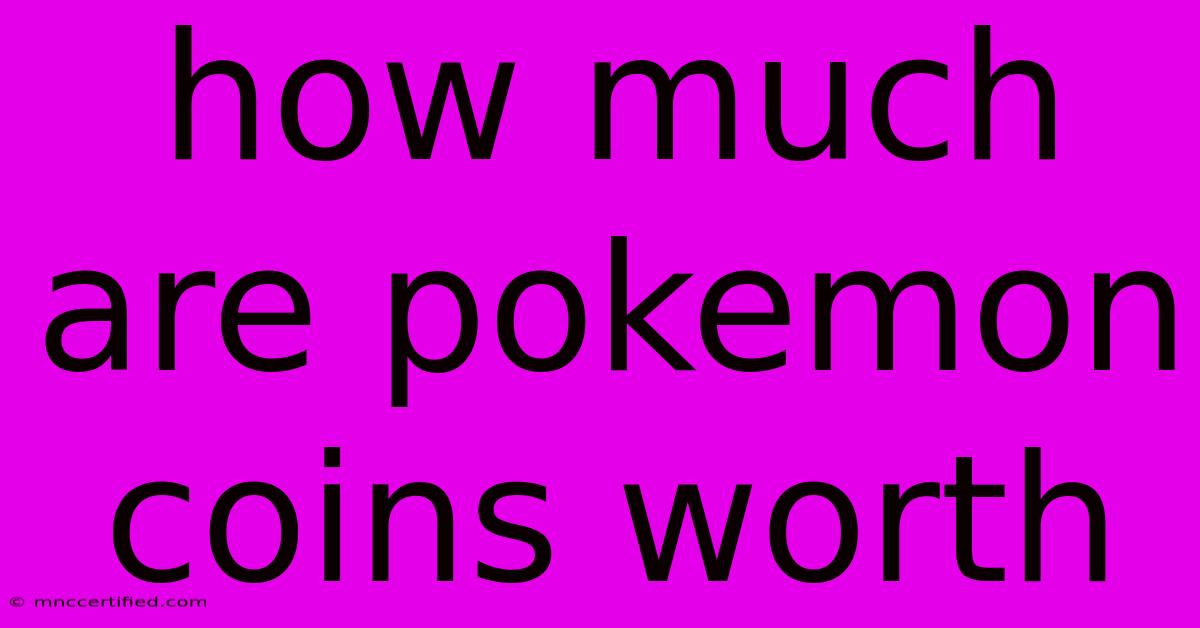How Much Are Pokemon Coins Worth

Table of Contents
How Much Are Pokémon Coins Worth? A Comprehensive Guide
Pokémon coins aren't physical currency you can hold in your hand; they're a virtual currency used within the Pokémon franchise, primarily in Pokémon Masters EX and Pokémon Unite. Their value isn't fixed like a dollar or euro; it's entirely dependent on their in-game utility and the player's perspective. This guide will explore how much Pokémon coins are "worth" from several angles.
Understanding the Value Proposition of Pokémon Coins
The perceived worth of Pokémon coins boils down to what you can buy with them. This includes:
- In-game items: Pokémon Masters EX and Pokémon Unite use coins to purchase powerful items, sync pairs (Masters EX), or Pokémon and battle items (Unite). These items directly impact gameplay, potentially giving players a competitive edge. The "worth" here is subjective; a highly sought-after sync pair or a game-changing item holds more value than a common one.
- Time-saving aspect: Instead of grinding for hours to earn in-game currency, players can buy coins to accelerate their progress. This convenience is a significant factor in their value, especially for busy players who prioritize efficiency over time investment.
- Rarity and Exclusivity: Some items purchased with coins might be limited-time offers or exclusive to certain events. This scarcity increases their perceived value among collectors and players wanting unique in-game assets.
Converting Pokémon Coins to Real-World Value: A Difficult Task
Unlike traditional currencies, you can't directly exchange Pokémon coins for real money. This makes assigning a precise monetary value challenging. However, we can consider some indirect comparisons:
- Cost per coin: The price of purchasing a specific amount of coins with real money varies based on the bundle size. Larger bundles typically offer a better "value" per coin, though the overall cost is higher. Analyzing these prices gives a rough estimate of what the developers consider a single coin "worth."
- Value of in-game items: The cost of premium items purchased with coins can indirectly reflect their worth. If a powerful item costs 5,000 coins, you can infer its real-world equivalent based on the real-money price of the 5,000-coin package.
- Player perception: Ultimately, the true "worth" of Pokémon coins depends on the individual player's willingness to spend real money on them. Some players might see them as invaluable for enhancing gameplay, while others might consider them overpriced.
Factors Influencing the Perceived Value of Pokémon Coins
Several factors influence how much players value Pokémon coins:
- Game meta: Changes to the game's meta, such as new updates or balance patches, can alter the relative value of specific items purchased with coins. Powerful items become more valuable, and less effective ones depreciate.
- Player skill: A skilled player might achieve the same results with fewer resources, making Pokémon coins less essential. Conversely, less skilled players may perceive a greater need for them.
- Limited-time events: The availability of exclusive items during limited-time events inflates the perceived value of coins. Players are more willing to spend to acquire these rare rewards.
Conclusion: The Subjectivity of Value
Determining the precise monetary value of Pokémon coins is impossible. Their worth is subjective and depends on numerous factors, from the in-game items they purchase to the player's individual needs and preferences. Instead of focusing on a fixed numerical value, consider their utility within the game and your personal gaming experience. The true worth of Pokémon coins is the enjoyment and advantage they provide in your Pokémon journey.
SEO Keywords Used:
- Pokémon coins
- Pokémon Masters EX coins
- Pokémon Unite coins
- in-game currency
- value of Pokémon coins
- cost of Pokémon coins
- Pokémon coin price
- virtual currency
- Pokémon game currency
- how much are Pokémon coins worth
This article incorporates various SEO best practices, including:
- Header structure: Uses H2 and H3 tags for clear organization and keyword placement.
- Keyword optimization: Naturally incorporates the primary and related keywords throughout the article.
- Readability: Employs clear, concise language, bullet points, and short paragraphs to enhance readability.
- Engagement: Addresses user questions and provides a comprehensive guide.
This approach aims to improve the article's search engine ranking and user engagement. Remember to further promote this article through social media and other off-page SEO strategies to maximize its reach.

Thank you for visiting our website wich cover about How Much Are Pokemon Coins Worth. We hope the information provided has been useful to you. Feel free to contact us if you have any questions or need further assistance. See you next time and dont miss to bookmark.
Featured Posts
-
Court Recounts Rileys Final Hours
Nov 21, 2024
-
Jelly Roll And Brooks And Dunns Believe Cma Performance
Nov 21, 2024
-
Man Convicted In Riley Nursing Student Murder
Nov 21, 2024
-
O2t Crypto Price Prediction 2025
Nov 21, 2024
-
Garage Keepers Insurance Florida
Nov 21, 2024